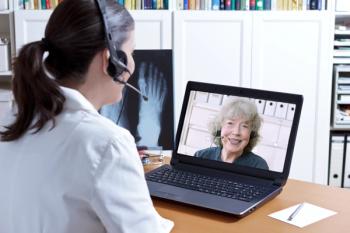
Rapid Rollout of Telemedicine Aids Cancer Care During COVID-19 Pandemic
Clinicians from Lombardi Comprehensive Cancer Center spoke about moving cancer care to telehealth due to the COVID-19 pandemic.
In a Facebook broadcast series from Georgetown Lombardi Comprehensive Cancer Center, John Marshall, MD, and Claudine Isaacs, MD, discussed moving cancer care to telehealth as a result of the coronavirus disease 2019 (COVID-19) pandemic.
Both clinicians highlighted that telemedicine seemed like something that would be really effective in theory, however it was never truly implemented in practice until the outbreak of COVID-19. Thus far though, it has proven to be an effective mean of safely scheduling visits with patients with cancer.
“Once COVID really changed our lives dramatically basically overnight, we realized the importance of us being able to reach out and connect with our patients in a more virtual way,” Isaacs, professor of Medicine and Oncology and co-director of the Breast Cancer Program at the Lombardi Comprehensive Cancer Center, said. “So, I think both as clinicians and as patients people have been very grateful that this has rolled out and rolled out so quickly.”
Isaacs went on to explain that though phone consultations were already being utilized before the pandemic, telemedicine has provided a more personal way for healthcare providers and patients to communicate. Even further, Marshall suggested that this informal way of meeting with patients has facilitated conversations in which he believes he may have been able to actually collect more information on patients.
“It’s a different level of intimacy, it’s almost a house call in some ways and I actually think we’re learning more than we would have learned if they had gotten all dressed up and come into the hospital,” Marshall, chief of the Division of Hematology and Oncology at Medstar Georgetown University, professor of Medicine and Oncology at Lombardi Comprehensive Cancer Center, and director of the Otto J. Ruesch Center for the Cure of Gastrointestinal Cancer, said.
This sort of system is not suitable for all patient visits though as both clinicians pointed out, and for those on more active treatments, individuals may not be able to stay away from clinics entirely. Additionally, with little research currently available as to how the virus affects patients with cancer, Isaacs suggested that it is unclear as to what level of danger the virus poses to this patient population. However, with social distancing measures being the most effective means of preventing COVID-19 transmission, it is increasingly more important that patients stay home as much as possible.
“Even in the very best of circumstances, we cannot ensure that nobody that they might come in contact with has COVID, so that’s part of what we’re trying to do,” Isaacs said. “So, if you don’t need to get out of your house, you shouldn’t get out of your house is the bottom line.”
Notably, an issue with telemedicine that Marshall pointed out was the lack of access to a multidisciplinary team that is typically available when meeting with patients in clinic. Without the nurses, nutritionists, and others generally involved physically together to strategize care for patients, more communication on the side of the care team has been necessary according to Isaacs; however, she stressed that it is important that patients still know there is a team of individuals caring for them.
“I think it’s really important that the patients know us as part of a team. It’s important to see that, or hear that, or do something along those lines, but it does require more communication,” Isaacs explained.
Ultimately, both Isaacs and Marshall indicated that they believe telemedicine will be increasingly utilized, even after the COVID-19 pandemic is over. Though this technology does not replace an in-person visit, it does present as a beneficial substitute in cases where that is not feasible.
“We have to remember the big picture with cancer care is that we’re trying to cure people for their whole life, and we have to figure out how to navigate that in the midst of this pandemic,” said Isaacs. “I think there are times as we look beyond COVID, whenever that might be and I hope it’s sooner rather than later, I see that this will be a tremendous boom for us because there will be places where this will continue to be an important and effective mode of communication.”
Newsletter
Stay up to date on recent advances in the multidisciplinary approach to cancer.






































